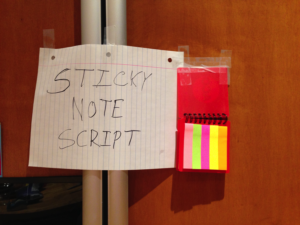Getting Organized is a Messy Business

Helping our kids learn to get themselves organized is one of the greatest challenges we face as parents, isn't it?
We all appreciate how important it is for our kids to learn to “get organized,” because we understand what our kids don't, yet, that organization impacts every aspect of life: school (or work), home, and relationships. For those of us who still struggle with organization as adults, we feel all the more urgent that our kids get their act together. We don't want them to struggle like we do.
In response to this legitimate concern, however, we parents are notorious for responding in less than helpful ways. We tend to:
- become over-invested in our kids' organization (like obsessing about a clean room)
- do too much (or too little) for them
- give our kids suggestions (and then get frustrated or angry when they don't follow them)
- expect our kids to figure it out for themselves (and then get frustrated or angry when they don't)
But the truth is, whether you're an “organized” parent, or not, your kids are going to have to figure out for themselves how to manage time and juggle work loads, at least to some extent. You can help them, of course. But at the end of the day, they'll be most successful when they come up with their own approach, when they choose systems and structures that work FOR THEM.
So for better long-term results, you might want to start letting them try it THEIR way now!
Learning from Mistakes
Much like the making of sausage and the creation of legislation, learning to get organized (especially for someone whose brain is not exactly wired that way) can be … well … a little messy.
It can be maddening, too. As parents, we see what needs to be done, but our kids don't see what we see, or trust us to guide them. We want to save them from learning it the hard way; but, more often than not, they don't want our advice.
In truth, when they learn to figure it out on their own, it's more effective. And remember, our long-term goal is not to get them through a particular assignment or chore. It's to teach them how to set expectations for themselves, and figure out how to achieve them.
Article continues below...
Minimize Meltdowns!
Download a free tipsheet "Top 10 Ways to Stop Meltdowns in Their Tracks" to stop yelling and tantrums from everyone!
Trial and Error
Sometimes there's no better way for kids to learn than good ‘ol fashioned trial and error. You've gotta stumble before you walk, and babble before you talk. That's how the brain locks in the learning.
The trick for us parents is to allow for errors without getting judgmental. In other words, no saying (or implying) “I told you so.” Our kids need to be able to try something and make mistakes freely without feeling that they are doing it wrong.
Real Life Example
The picture above offers a real-life example of my son trying to figure out something on his own, even though it was what I might describe as a “messy” strategy.
He needed to put sticky-notes on his script for the school musical, but he kept forgetting to do it. The director was getting annoyed, so he devised a strategy to get himself to do the assignment.
If he had asked me for help, I might have suggested he schedule time to do it and put it on his calendar, or not allow himself to play “Clash of Clans” until the task was done. But he didn't ask me. No great surprise there!
He had his own idea. He taped his task – with the materials he'd need to complete it – to the refrigerator doors so that they could not be opened without paying attention to the task. And then he set his alarm – and asked for help to wake up early. I teased him playfully, and he defended his reasoning like a champ.
His strategy made sense to him and was designed to remind him at the time he planned to do it – before breakfast (not MY idea!). It did require co-opting the family refrigerator for one night, but I figured that probably wasn't hurting anyone, so I let it go :).
And guess what? He got those sticky-notes done before school the next day.
Long Term Gains
Was this solution a good long-term strategy for getting Algebra homework done in High School? Hardly. Textbooks are too heavy to tape to the fridge!
But my son went through the steps himself – figuring out when he would do the assignment, what materials were needed, and how to remind himself at the time to get it done. AND… he had success in the process.
So even though he devised a “messy” strategy, he acquired skills he will hone in coming years. He may still leave big notes to remind himself of important things (I certainly do!), and he may even tape up the refrigerator at night (his dad did to avoid morning eating before a doctor's appointment). But what's most important is that he started to get in the habit of putting a system in place and getting results – and that's a critical skill for long-term success!
Getting organized is not always neat and orderly, and it usually requires making a mess in order to straighten it up.
And the process of LEARNING to get organized is just as messy.
But if you're patient while your kids figure out what works for them, you'll be pleasantly surprised when they start doing more and more for themselves. As an added bonus, not only will you get to stop nagging, but you might even find that they start learning to clean up their messes. Wouldn't THAT be nice?!

